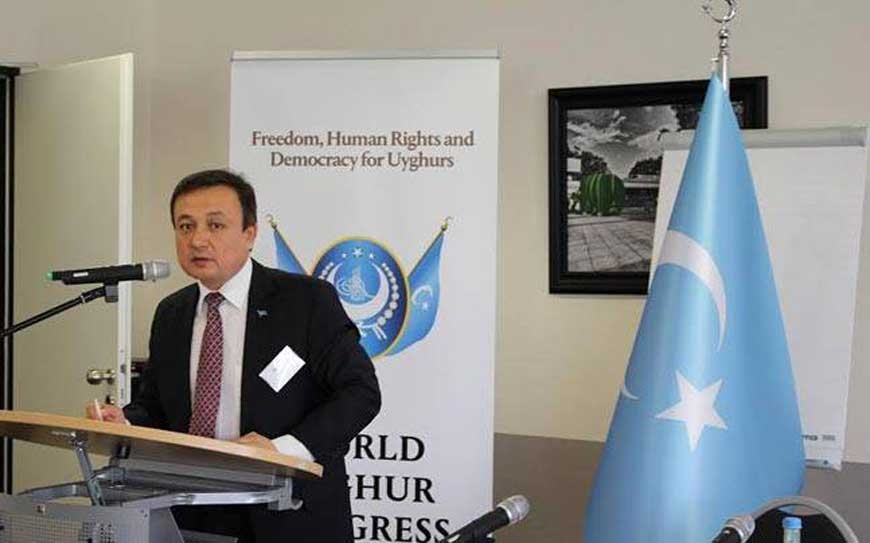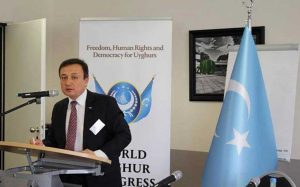Response to Mr. Giancarlo Elia Valori’s Additional Considerations

Modern Diplomacy, 9 December 2016

By Dolkun Isa— The purposeful spread of misinformation continues to impede those looking to uncover truth in the 21st century. As an activist in the Uyghur democracy movement, I am, to put it lightly, at constant odds with the Chinese government.
As Secretary General of the World Uyghur Congress (WUC), one of the main pillars of my work – since organizing student protests against discrimination in Urumqi in the 1980s until today – has been laying bare the conditions the Uyghur population contend with in modern China.
It is for this reason that I must put to rest many of the accusations and personal attacks against my character here. As an activist, it is hard enough advocating on behalf of a group largely ignored by the international community, and harder still when I must counter patently false claims that nearly always originate from the Chinese Communist Party in Beijing.
With this in mind, Mr. Giancarlo Elia Valori, an Italian economist and businessman, recently published two articles on this online news platform. The article published November 4th, “The strategic issue of the Uyghur political-military movement”, and an additional article published December 2nd, “Additional considerations on the Uyghur issue”, especially drew our concerns. These two articles not only partially and unrealistically depict the China-Uyghur relationship and Uyghur human rights activities, but has also provided false information about me, my personality and other members of the WUC.
The WUC first responded on Modern Diplomacy to Mr. Valori’s first article and acknowledged the misinformation, but Valori did not take into account our response and conversely, he continued to emphasize his false claims. Had Mr. Valori reached out personally for my own comment on these claims, it would have been appreciated, but no such communication took place. I regrettably, then, find it necessary to compose a response to these claims once again, many of which are directed squarely at my person.
Valori begins by contending that, “Xinjiang is the leverage for China’s future strategic destabilization”, which immediately points to his intention of unfairly defaming the Uyghur cause. From my perspective, an academic should deliver facts, rely on evidence, maintain professional discipline, and make conclusions that depend on reliable, accurate information within a meaningful context – something Valori fails to do throughout.
Although I find it most useful to directly confront many of the claims made in the article about myself and the Uyghur cause, I believe it necessary to provide some background on Valori to begin with.
Valori has some academic background in Peking University, Hebrew University and Yeshiva University. He is now an honorary president of Huawei Italy and economic adviser of the Chinese giant HNA Group. These two companies act in close cooperation with the Chinese government on projects and have a direct relationship with the current Chinese administration. It is no small leap to suggest that Valori may be attempting to speak for the government to which he has worked in indirect cooperation with and has vested economic interests.
For many years, academics that have worked at well know universities in China, once regarded as honored guests, are now forbidden from entering the country. For example, Dr. Dru Glandey from the University of Hawaii, Dr. Sean Roberts of Georgetown, Dr. Yitzhak Schicor from the University of Haifa and Dr. Elliot Sperling from Indiana University cannot enter the country of which they have studied for decades because of their sincere attempts at understanding the situation there.
If we analyse details of the article, many tend to follow a similar pattern that closely follow what has been put forward solely by the Chinese government and never verified by any third party. It is therefore necessary to personally address these claims since they have been floated elsewhere in the past.
Valori first states in his article that, “We cannot understand why the Federal Republic of Germany hosts [the WUC].” The author, then, seems to expect that the German government has not done its due diligence in ensuring that our organization should be able to function within its borders. This, of course, could be nothing further from the truth considering the WUC has worked closely with Germany for more than a decade – a relationship that functions on the basis of transparency and mutual respect. It is worth noting that the Chinese government has gone to great lengths in order to discredit our organization throughout the same decade.
Since our founding in 2004, we have worked within the German political and legal system for the purpose of promoting democracy, human rights and self-determination for the Uyghur people through peaceful and democratic means. All activities of the WUC are made known to the public and as a registered association in Germany, is subject to government oversight.
Valori then writes that, “The WUC is now led by a German citizen, Dolkun Isa, a Uyghur resident in Aksu, in the Keping district of Xinjiang, even though we do not know whether this is still the case”. To suggest that the public is unaware of my current residence is nonsensical considering that I have permanently lived in Germany since 1996 and am a German citizen.
He then continues by claiming that, “[…] He is also vice-President and the founder of the East Turkestan Liberation Organization (ETLO), founded in Istanbul in 1996.” This false claim has been repeated ad nauseam by the Chinese government alone, and like many others, not a shred of evidence has ever been uncovered to support it over the years.
Regarding the ETLO, the first time I heard the name was through Chinese state-controlled media in 2003. The author may have confused this piece of information with the fact that I was elected as president of the World Uyghur Youth Congress in 1996 instead.
The author then goes on stating that I had financed the travel of two militants to participate in training camps in Nepal – a further claim also made by the Chinese government. Once again, no evidence is offered in support. In fact, in the years that the author insists I made financial contributions to militants, I was studying and working part time in Germany simply to support my young family. It may be worth reminding the author that delivering pizza until midnight is not exactly sufficient to open a training camp or purchase one-way tickets to Nepal.
Moreover, the author takes those unsubstantiated claims a step further and argues that I have personally pressured European governments, including Germany, to “accept as refugees ETLO militants or Uyghurs who are probably jihadist militants undercover.” Anyone with a modicum of knowledge about immigration policy would recognize the ridiculousness of this claim – an explanation which warrants no attention here.
The author makes additional claims that I attended meetings in Paris and Milan at the beginning of November. I was, however, not in either city at the time, but working in Geneva to attend a meeting at the UN. Further, I have not travelled to Milan yet in my life, but would be willing should the author extend an invitation to his home country. These latter mistruths are even more difficult to comprehend considering their recentness.
Notwithstanding the author’s claims, ethnic discrimination, a dearth of economic opportunities, and constant pressures on cultural expression including religious practice and language have all contributed to strong resentment and unfortunate violence in some cases in East Turkestan. The author, regrettably, does not dare mention this throughout his purported exposé on myself and the WUC.
For many years, the international community has published countless reports from diverse sources about some of these policies, Human Rights Watch and Amnesty International among them. Valori fails to mention any of this information in his article, which surprised me, considering his clear, but perhaps misplaced, interest in the issue.
To sum up, we can plainly see that Mr. Valori’s purpose here has not been sincere. His own economic interests may have been put ahead of truth and objectivity. It is for this reason that he has forgotten that as an intellectual, he has sacrificed his own credibility.
Since Xi Jinping took power in 2013, not only have the human rights of Uyghurs and Tibetans been on the decline, but pressure on the Chinese people has also steeply increased. Some are arguing that under Xi, they are experiencing a “Second Cultural Revolution.”
Hundreds of human rights activists, lawyers and journalists have been shut down and imprisoned by the state. Anyone interested in the genuine rights claims of millions should first speak and write honestly about the situation, rather than spending time reinforcing falsehoods.
Finally, I urge the international community, including Mr. Valori, to pay closer attention to the human rights situation facing the Uyghur population in East Turkestan today. Besides the WUC, there are many other reputable organizations doing their part to uncover persistent and intolerable abuses that will only be addressed through the pursuit of greater transparency.

